跨文化交际4
- 格式:pptx
- 大小:8.93 MB
- 文档页数:42
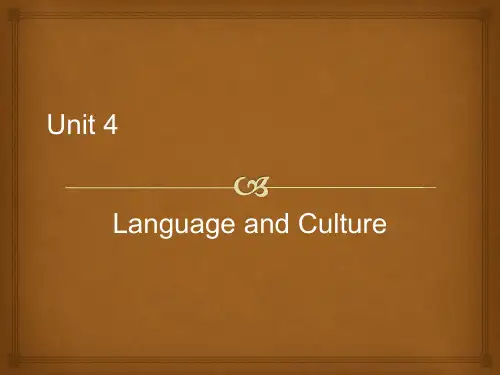
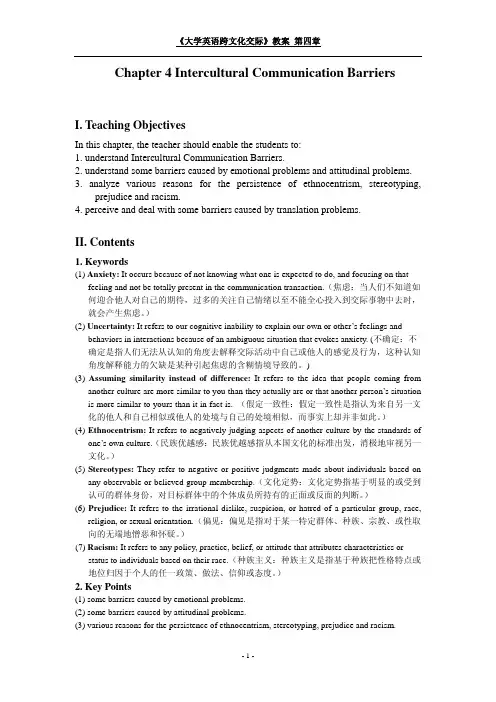
Chapter 4 Intercultural Communication BarriersI. Teaching ObjectivesIn this chapter, the teacher should enable the students to:1. understand Intercultural Communication Barriers.2. understand some barriers caused by emotional problems and attitudinal problems.3. analyze various reasons for the persistence of ethnocentrism, stereotyping,prejudice and racism.4. perceive and deal with some barriers caused by translation problems.II. Contents1. Keywords(1) Anxiety: It occurs because of not knowing what one is expected to do, and focusing on thatfeeling and not be totally present in the communication transaction.(焦虑:当人们不知道如何迎合他人对自己的期待,过多的关注自己情绪以至不能全心投入到交际事物中去时,就会产生焦虑。
)(2) Uncertainty: It refers to our cognitive inability to explain our own or other’s feelings andbehaviors in interactions because of an ambiguous situation that evokes anxiety. (不确定:不确定是指人们无法从认知的角度去解释交际活动中自己或他人的感觉及行为,这种认知角度解释能力的欠缺是某种引起焦虑的含糊情境导致的。

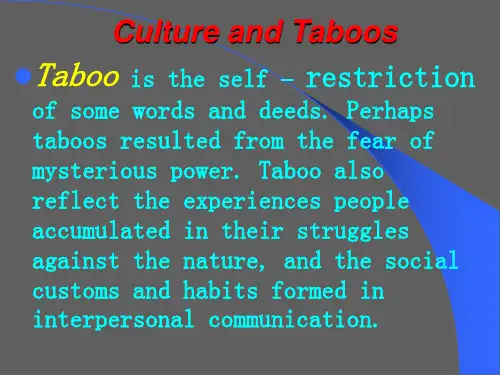


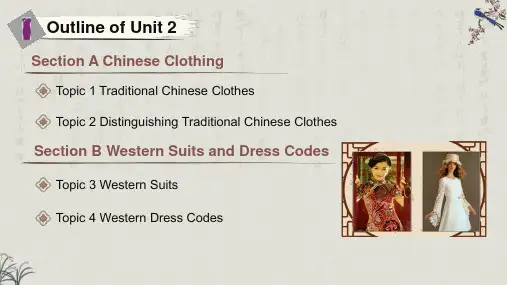

最重要的四个跨文化交际原理跨文化交际是在不同文化背景下进行有效沟通和相互理解的过程。
在全球化的今天,跨文化交际变得尤为重要。
为了帮助您更好地应对跨文化交际的挑战,以下是四个最重要的跨文化交际原理:1. 尊重和感知不同文化跨文化交际的基础是尊重和感知不同文化。
了解和尊重他人的文化差异是建立良好关系和避免冲突的关键。
在交流中展示出对对方文化的理解和尊重,可以帮助消除误解和偏见。
通过研究和关注其他文化的价值观、、礼仪和俗,您可以更好地适应和融入不同的文化环境。
2. 改善语言和非语言交际语言是跨文化交际中最常用的工具。
但是,语言的使用也可能引发误解和摩擦。
重要的是要保持清晰和准确的表达,避免使用含糊不清、难以理解或具有文化敏感性的词语。
此外,非语言交际,如身体语言、表情和肢体动作,也扮演着重要的角色。
了解并适应不同文化中的非语言交际方式可以帮助您更好地理解对方的意思和情感。
3. 培养跨文化敏感度和灵活性跨文化交际需要培养跨文化敏感度和灵活性。
这意味着您需要对不同文化的价值观、、俗和行为规范保持开放的态度,并能够适应和调整自己的交际方式。
了解文化之间的差异并学会妥协和适应可以帮助您更好地与他人建立联系,并在跨文化环境中取得成功。
4. 提高文化知识和跨文化交际技巧研究和提高文化知识是跨文化交际的关键。
了解其他文化的历史、传统、价值观和社会俗,可以帮助您更好地理解和尊重对方。
此外,掌握跨文化交际技巧也是必不可少的。
例如,学会倾听和观察,提出明确的问题和回应,以及灵活运用适当的交际策略,都是有效跨文化交际的技巧。
以上是四个最重要的跨文化交际原理。
通过遵循这些原理,您将能够更好地应对跨文化交际的挑战,建立更有效的跨文化关系,并在全球化的环境中取得成功。
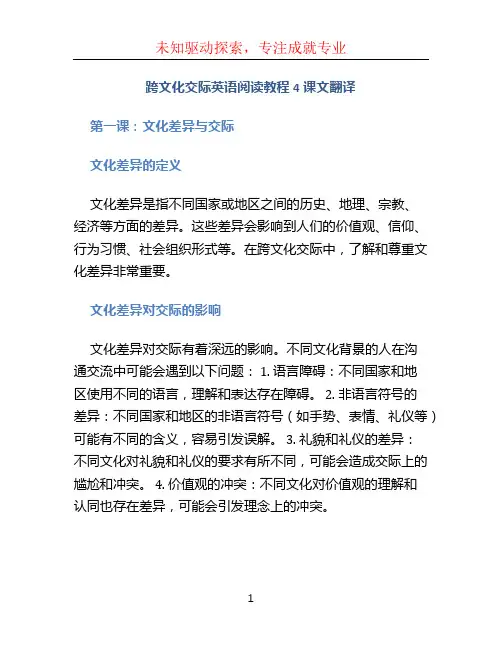
跨文化交际英语阅读教程4课文翻译第一课:文化差异与交际文化差异的定义文化差异是指不同国家或地区之间的历史、地理、宗教、经济等方面的差异。
这些差异会影响到人们的价值观、信仰、行为习惯、社会组织形式等。
在跨文化交际中,了解和尊重文化差异非常重要。
文化差异对交际的影响文化差异对交际有着深远的影响。
不同文化背景的人在沟通交流中可能会遇到以下问题: 1. 语言障碍:不同国家和地区使用不同的语言,理解和表达存在障碍。
2. 非语言符号的差异:不同国家和地区的非语言符号(如手势、表情、礼仪等)可能有不同的含义,容易引发误解。
3. 礼貌和礼仪的差异:不同文化对礼貌和礼仪的要求有所不同,可能会造成交际上的尴尬和冲突。
4. 价值观的冲突:不同文化对价值观的理解和认同也存在差异,可能会引发理念上的冲突。
跨文化交际的技巧为了更好地进行跨文化交流,以下是一些技巧: 1. 学习对方的语言:学习对方的语言可以加深理解,减少语言障碍。
2. 了解对方的文化:了解对方的文化背景、价值观念和行为习惯,增进理解和尊重。
3. 尊重对方的非语言符号:避免使用可能被对方误解的非语言符号,尊重对方的习俗和文化。
4. 灵活调整自己的礼貌和礼仪:在不同文化背景下,灵活调整自己的礼貌和礼仪,以尊重对方的文化。
5. 接纳不同的价值观:不同文化的人们对于相同事物的看法可能存在差异,要学会接纳并理解对方的价值观。
第二课:文化沟通中的误解和解决高、低沟通语境的差异高沟通语境的文化中,人们通过非语言符号、隐含的信息和环境背景来传递信息;低沟通语境的文化中,人们更加注重直接明确的信息。
了解和适应不同的沟通语境是避免误解的关键。
文化差异引发的误解1.时间观念:在一些高度重视时间效率的文化中,迟到被视为不尊重;而在某些文化中,迟到是普遍存在的现象。
2.礼貌和直接表达:一些文化注重礼节和婉转的表达方式,而另一些文化更加注重直接坦率的交流。
3.非语言符号:不同文化的手势、表情、身体接触等非语言符号可能有不同的含义,可能会引发误解。


Unit 4 词汇与意义⏹教学内容:⏹(1)词汇的概念意义、内涵意义、社会意义、情感意义和搭配意义。
⏹(2)中英词汇对比⏹基本要求:⏹了解词汇在语言的跨文化交际中的地位,掌握词汇的几种意义,中英语言在词汇方面存在的差别。
重点是词汇的内涵意义及中英词汇的差别。
Importance⏹If we want to study the difference between two languages, we have to begin with the study of the words in the two languages. Because the close relationship between language and culture is most readily seen in words.Section 1 T ypes of meanings⏹1. Conceptual meaning概念意义⏹the basic meaning presented by a word. It refers to logical, cognitive(认知的), referential (指示的), or denotative(外延的)content.⏹also known as surface meaning or denotative meaning外延意义, dictionary meaning or literal meaning字面意义of a word.Features of Conceptual meaning概念意义⏹1. It is the core of the meaning of a word. It is the basic meaning represented by meaningful linguistic units. It‟s recorded in the dictionary.⏹E.g. woman-an adult female human being.⏹Dog-a four-legged animal which can make the sound of barking⏹2. It can be divided into some semantic components(语义成⏹分).⏹Woman: +animate(有生命) +human(人) - male (男性) -adult(成年)I⏹boy:⏹3. It is relatively constant and stable, because it is the meaning agreed upon by all the members of the same speech community.But it may also vary.⏹Manuscript =“手稿” now also including文稿printed from typewriter or computer Note: Many different words can have the same conceptual meaning⏹walk⏹to move forward by placing one foot in front of the other. The newlyweds新婚夫妇strolled down漫步the streets of Paris.⏹The wealthy businessman swaggered大摇大摆地into the restaurant and demanded a table.The overweight man lumbered笨重地行动along, breathing heavily and occasionally tripping.⏹These synonyms, although with different connotative meanings内涵意义, have the same conceptual meaning.The English Words unique in English culture⏹A. words related with geography⏹e.g. New England, Canberra, Northern Ireland, Sydney, London, Edinburgh, Greenwich, Quebec, Ottawa,⏹The Thames River, St. Lawrence, British Isles, The Rocky Mountains(落基山脉), The Mississippi River, The Niagara Falls,⏹koala, kangaroo, tornado(龙卷风)⏹The Great Barrier Reef, Silicon V alley, Yellowstone Park,⏹Summary:All these have their own geographical features: places, plants and animals uniquely found in USA, Great Britain and Australia; They all represent meaning unique in their own cultures;Their Chinese equivalents are only used by the Chinese people as mere names, which have lost their distinctive geographical and cultural features.The English Words unique in English culture⏹A. words related with geography⏹e.g.⏹U.S.A: New England, The Rocky Mountains,The Mississippi River, The Niagara Falls,Y ellowstone Park, Silicon V alley⏹Britain: British Isles, Northern Ireland, London, Edinburgh, Greenwich, The Thames River, Rose⏹Canada: Ottawa, Quebec, St. Lawrence,⏹Australia: Canberra, Sydney, The Great Barrier Reef, koala, kangaroo⏹B. words and history⏹the May Flower⏹(the ship in which a group of⏹British Puritans who were also⏹known as pilgrim fathers sailed to⏹America in 1620.⏹The revolutionary war⏹( the struggle of the 13 colonies in North America for independence from the British rule between 1775-1783)⏹Scalp(头皮)⏹(to tear the skin on the top and back of head and the hair attached from an enemy by an North American Indian as a trophy战利品)⏹⏹Knight⏹(a man given the rank of knighthood by the British Monarch in recognition of merits in public service)⏹Hippy/Hippie⏹(a young man and young woman who rejects authority, existing institutions and conventional attitudes towards morality, style of dress, etc.)⏹C. word and politics⏹USA: President, Secretary, Congress, Senate, the House of Representatives, The Democratic Party, The Republican Party, the Supreme Court⏹Great Britain: Parliament议会:the supreme legislative body of the United Kingdom. It comprises the sovereign, the House of Lords and the House of Commons.议会两院尤指英国由上议院和下议院构成的国家立法机关; Prime Minister, The Conservative Party, The Labour Party, Supreme Court of Judicature司法⏹Governor行政长官⏹the official title of the representative of the British monarch in a British colony.⏹Governor general总督⏹the personal representative of the British crown in the independent nations of the commonwealth.⏹e.g. The Canadian Governor General⏹Constitutional monarchy君主立宪制⏹a monarchy in which the powers of the rulers are restricted to those granted under the constitution and laws of the nationD. words and religion⏹Bible⏹a collection of religious books comprising the Old Testament and New Testament⏹reformation:宗教改革⏹a 16th century religious movement against the abuses in the Roman Catholic Church, ending in the formation of Protestant Churches.⏹Christmas box耶诞礼物或礼金⏹money given at Christmas time to the dustmen and others who provide a service throughout the year.⏹Boxing day节礼日⏹the first week day after Christmas, a legal holiday in England⏹Easter⏹the chief Christian feast, which celebrates the Resurrection of Christ, on the first Sunday after the full moon that coincides with or comes after the spring equinox.E. words and HolidaysChristmas cake/pudding/card/tree/carol/stockingFather Christmas), Santa Claus(A)⏹F. words and currency⏹Pound, penny; the American dollar, cent, quarter, nickel⏹G. Words and law⏹Court, judge, jury, lawyer, attorney (A)⏹H. Words and way of life⏹Snack Bar, roast beef, hamburger, sandwich, barbecue, cocktail, champagne; pajamas, suite, dress; subway, Greyhound bus; drive-ins, diner,⏹I. words and sports⏹Football, soccer, rugby, hockey, cricket⏹J. words and sex⏹Striptease, sex store, sexual interference, prostitute, whorehouse⏹K. words and personality⏹GB: reserve, practical, insularism偏执⏹USA:individualism, rapid pace of life, direct, promptness, informality, originality, materialism English works partly corresponding with Chinese words in conceptual meaning⏹1. Intellectual--知识分子⏹2. social sciences--社会科学⏹3. drugstore--药店⏹[美]杂货店(出售药物、糖果、饮料,化妆品,杂志及其他杂物的店铺)⏹4. Morning=午夜+凌晨+黎明+早晨+上午⏹5. Y oung(18-40), middle-aged(40-60), old (over 60)-------老中青⏹Discussion: discuss the conceptual differences between the words in each pair⏹yard--院子⏹peasant--农民⏹idealist-唯心主义者⏹materialist--唯物主义者"family" and jiating (家庭)⏹An American (A) attended her Chinese friend's (B) wedding. Two years later, the two met again.⏹A: Have you started a family'!⏹B: Oh, yes. Y ou attended my wedding, remember?⏹A: I mean if you've had children.⏹Here we see that ' family' means more than jiating (家庭) ,though they seem to be equivalents.2. Connotative meaning内涵意义⏹the implication(含义,暗示)of words, apart from its primary meaning.It is the communicative value that an expression has in addition to the purely conceptual meaning. It varies from culture to culture and from individual to individual⏹E.g. Woman⏹Physical: biped(双足的), having a womb(子宫)⏹Personality: gentle, compassionate, sensitive, hard-working, frail脆弱的, emotional, prone to tears, irrational, inconstant变化无常的,subject to maternal instinct, behavior: capable of speech, experienced in cookery, skirt or dress wearing,⏹Dog⏹loyal to owner, fierce凶猛的, violentFeatures of Connotative meaning内涵意义⏹1. Despite cultural background difference, some corresponding words in two languages may convey the same connotative meaning. e.g tiger, 老虎--cruelty⏹E.g. Woman⏹2. words with the same conceptual meaning yet different connotative meaning⏹书, book⏹老,old⏹同志,comrade⏹宣传,propaganda⏹狗,dogConnotative meanings vary according to different people, times, ages, societies etc.⏹E.g. Home: warm, loving, comfortable, safe⏹like a prison, cold, boring⏹终身大事⏹工作?事业?婚姻? 生死?⏹Connotative meaning may change with the times going⏹E.g. traditional: positive in the past⏹―old, conservative‖ at present⏹3. Social meaning社会意义⏹Social meaning is what a piece of language conveys about the social circumstances of its use, such as the language users( who are using the language), settings (where is language used), topics (what are language users are talking or writing).⏹E.g⏹home (general) , residence (formal), domicile(law), abode (literature),⏹horse, steed(战马), nag(老马),gee-gee(child)⏹throw(general) , cast (literature and religious), chuck(slang)⏹salt, sodium chloride⏹disobedient, recalcitrant反抗的⏹A good selection of words is important.Exercise!⏹Words which stand for what people do in order to make a living: job, vocation, profession, occupation, career, trade, work⏹Profession (an occupation requiring special education, especially in the liberal arts or sciences)所指的职业是需要在文科或理科方面有一定的教育程度,具备一定理论水平的人才的职业。
跨文化交际英语阅读教程4课后答案一、交际用语(10分,每题1分)根据情景补全对话,从A、B、C、D四个选项中选出一个能填入空白处的最佳选项。
1. —The visit to Italy is fairly good, though we did have quite a lot of rain. —________________. [单选题] *A. It's a wonderful journey.B. You must get wet.C. It's a hard journey.D. What a pity!(正确答案)2. —This is Kathy Chen, our Financial Officer. —__________________. [单选题] *A. Finance Officer is an important position.B. OK. Let's go to see her.C. I'm pleased to meet you, Kathy.(正确答案)D. Thank you, Kathy.3. —Would you mind if I smoke here? —___________________. [单选题] *A. Yes, go ahead.B. No, I wouldn't mind at all.(正确答案)C. No, you cannot smoke here.D. You are a smoker!4. —Sorry, I made a mistake again.—__________________________. Practice more, and you'll succeed. [单选题] *A. Take it easy.(正确答案)B. Certainly not.C. Don't mention it.D. Don't blame yourself.5.—______________________. —I am so glad that there was no traffic jam. [单选题] *A. How have you been recently?B. How did you come over here?C. How was the traffic coming over here?(正确答案)D. How was the position?6. —I've started my own software company. —______________________. [单选题] *A. Could you tell me who is the owner?B. No kidding! Congratulations!(正确答案)C. If I had the money, I'd start one.D. My company runs well.7. —Are you ready to buy a car, Sir? —_______________. [单选题] *A. Yes, please.B. Please don't buy it.C. No, don't mention it.D. Yes, I'd like to have a Jeep.(正确答案)8. —What is the distance between the two places? —__________________. [单选题] *A. The distance is not important.B. We should care about it.C. It is about 15 kilometers.(正确答案)D. It is not far away.9. —How did you enjoy the performance? —______________________. [单选题] *A. Perfect. It is attractive.(正确答案)B. It's up to you.C. It is a good question.D. Yes, you did well.10. —I love the Internet. I've come to know many friends on the Net.—__________________. Few of them would become your real friends. [单选题] *A. That's for sure.B. It's hard to say.(正确答案)C.I couldn't agree more.D. I'm pleased to know that.二、词语用法与语法结构(30分,每题1分)阅读下面的句子,从A、B、C、D 四个选项中选出一个能填入空白处的最佳选项。
最重要的四个跨文化交际观点
1. 文化意识的重要性
跨文化交际中最重要的观点之一是要对不同文化的差异有意识。
我们应该意识到每个文化都有其自己独特的价值观、、行为方式和
沟通方式。
了解和尊重他人的文化差异是建立良好的跨文化交际关
系的关键。
2. 倾听和理解
在跨文化交际中,倾听和理解对方的观点和经历是至关重要的。
我们应该尊重他人的观点,并努力理解他们的文化背景对其思维方
式和行为的影响。
通过倾听和理解,我们可以避免误解和冲突,并
建立良好的沟通基础。
3. 弹性和适应性
跨文化交际要求我们具备弹性和适应性。
不同文化之间存在着
差异,包括语言、礼仪、风俗和价值观等方面。
我们需要适应并接
受这些差异,以便在不同文化的环境中进行顺利的交流和合作。
4. 尊重和包容
尊重和包容是建立友好和平等跨文化关系的基石。
我们应该尊
重他人的文化、崇拜和生活方式,并对待他们以平等和友善的态度。
通过尊重和包容,我们可以减少偏见和歧视,并促进跨文化交际的
和谐发展。
以上是最重要的四个跨文化交际观点。
通过意识文化差异、倾
听和理解、弹性和适应性以及尊重和包容,我们可以建立更好的跨
文化交际能力,并与不同文化的人建立良好的关系。